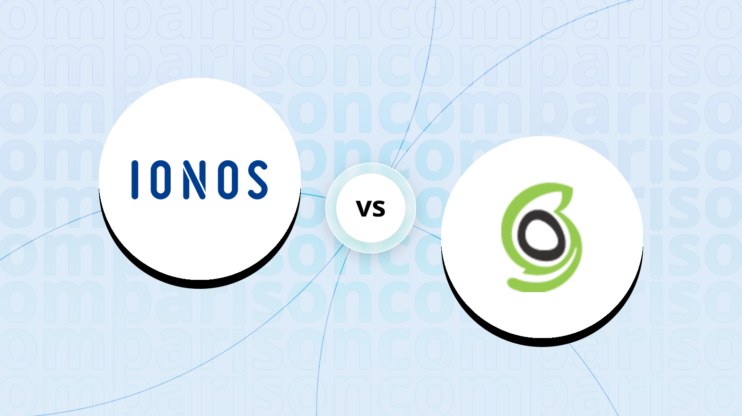Namecheap vs Hostwinds: Final verdict
Looking over Namecheap vs. Hostwinds, it’s clear why both hosts are so popular. They have both hosted millions of
websites that run on WordPress for decades, building up a loyal customer base.
-
Namecheap (Overall grade: 7.2)
presents a comprehensive hosting package with a user-friendly website builder and free SSL certificates, making it an appealing choice for beginners and those prioritizing security. It offers reliable uptime and superior streaming capabilities, especially for multimedia websites. However, it falls short in performance speed compared to Hostwinds. In terms of pricing, Namecheap stands out with more affordable and flexible plans, catering to various users’ needs ranging from small blogs to enterprise solutions.
Hostwinds (Overall grade: 7.1)
emphasizes performance and scalability, featuring SSD drives, free dedicated IP, and integration with Litespeed Web Server and Cloudflare CDN, which significantly boost website speed. Ideal for high-traffic websites, Hostwinds offers extensive customization and superior customer support through multiple channels, including phone support, 24/7 live chat, and email. While generally more expensive than Namecheap, it caters well to users needing reliable, high-performance hosting solutions. Some inconsistencies in performance and international loading times are minor flaws but overall, Hostwinds provides an excellent, robust service for a variety of user needs.
 Overall grade:7.2 |
 Overall grade:7.1 |
|
|---|---|---|
| Uptime and Availability | 8.0 | 7.2 |
| Hosting Performance | 8.2 | 8.4 |
| Hosting Security | 8.5 | 8.0 |
| Price | 8.7 | 8.5 |
| Hosting Features | 7.5 | 7.7 |
| Ease Of Setup | 8.8 | 8.7 |
| User Management | 0.0 | 0.0 |
| Customer Support | 8.0 | 8.0 |
| User feedback | 4.3/5 | 4.9/5 |
Hosting types offered
Both platforms provide a variety of hosting types, each designed to meet the different needs of users.
 |
 |
|
|---|---|---|
| Shared hosting | ||
| Cloud hosting | ||
| WordPress hosting | ||
| Ecommerce hosting | ||
| VPS hosting | ||
| Dedicated hosting |
Although both offer a variety of hosting plans tailored to different needs, in
certain cases, one platform may prove to be more suitable.
Detailed comparison
Uptime and availability
Evaluates the average uptime statistics, uptime guarantee and overall availability of the hosting
provider
Score Components:
- Uptime percentage (30%): evaluates the uptime statistics in given period of time
- Uptime guarantee (20%): Assesses if the platform offers an uptime guarantee and
whether the actual uptime matches the promised guarantee. - General performance (25%): Evaluates how fast is the average response time and overall
it’s stability. - Responsiveness (10%): Adaptability to different devices and screen sizes.
- Availability (25%): Reflects the total downtime and number of outages.
 8.0
8.0
 7.2
7.2
🏆 Winner Namecheap: Reliable uptime and consistent performance.
🏆 Winner
Namecheap: Reliable uptime and consistent performance.: It’s superior uptime and significantly faster response times make Namecheap a better choice for users who require high performance and stability from their hosting provider.
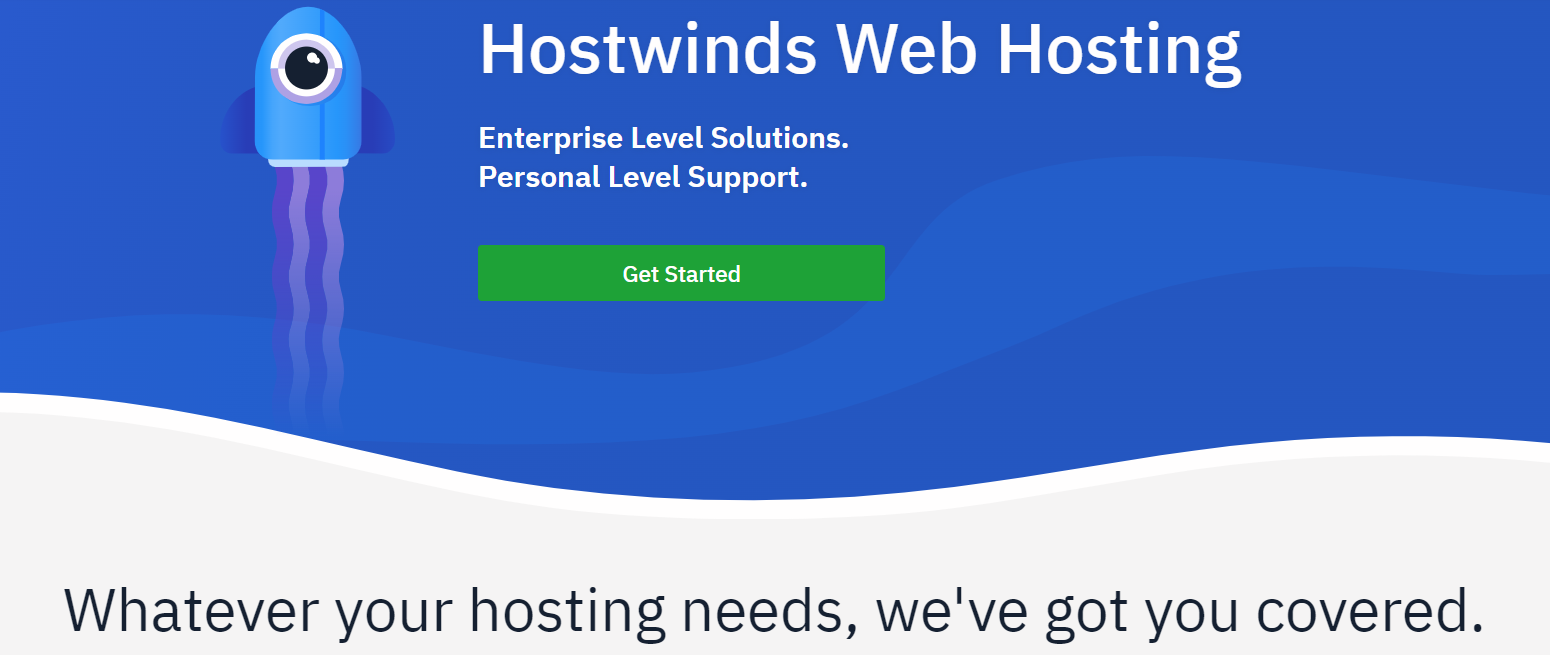
Namecheap shows a slightly superior performance in terms of reliability and speed. Both hosting services have impressive uptimes, with Namecheap slightly edging out Hostwinds with a 99.96% uptime over a 3-month period compared to Hostwinds’s 99.89%. This difference in uptime is reflected in the number and duration of outages, where Namecheap experienced minimal downtime, while Hostwinds had more frequent outages.

Namecheap’s advantage is more pronounced in terms of server response time. It boasted an average response time that demonstrates commendable reliability, which is significantly faster than Hostwinds’s average response time of 945ms. This suggests that Namecheap is not only more reliable in maintaining uptime but also in delivering faster website loading speeds, making it a preferable option for users prioritizing performance.
Which one has better hosting performance?
Score Components:
- Hosting speed (30%): This includes SSD quality, Load times, PageSpeed score ranges,
additional information on website speed, built-in plugins for performance enhancement, available caching
methods, and CPU/RAM options - CDN (20%): Considers whether CDN is available or not, whether it’s free or paid, and
the quality of the CDN service - Available data centers (30%): Evaluates the number of data centers and their locations
globally. - Scalibility (20%): Looks at whether elastic scaling is available, the process required
to scale (manual upgrade vs. automatic scaling), the presence of dedicated servers, and the costs
associated with scaling.
 8.2
8.2
 8.4
8.4
🏆 Winner
Hostwinds: Offers more comprehensive hosting features with higher overall performance.
Hostwinds employs SSD drives, the latest PHP versions, and Litespeed Web Server across its plans, which significantly boosts website speed. Namecheap also uses SSD storage and offers various caching options, but Hostwinds’ integration with Litespeed and Cloudflare CDN provides faster content delivery. Both providers offer free SSL certificates, unmetered bandwidth, and 24/7 support. Hostwinds has data centers in more locations, ensuring rapid load times worldwide. They also provide route-optimized networking, constantly enhancing performance by minimizing latency.
Website Speed
Hostwinds excels in website speed due to its deployment of Litespeed Web Server and Cloudflare CDN. These features significantly improve load times by optimizing data delivery routes and leveraging caching mechanisms. Namecheap’s WordPress hosting offers notable speeds with a time to first byte of 192 milliseconds and a fully loaded time of 0.7 seconds. Nevertheless, the combination of Litespeed and Cloudflare gives Hostwinds an edge in delivering consistently faster and more reliable speeds.
Scalability
Hostwinds offers instant scalability, allowing users to upgrade server resources quickly. Their hosting plans provide flexibility and automated scaling options. Hostwinds also offers dedicated servers, but specific pricing details for scaling were not provided. Namecheap provides various plans, including VPS and reseller hosting, allowing users to upgrade as needed. However, the process is more manual, requiring plan upgrades rather than automatic adjustments.
Which one has better security features?
and regulatory requirements
Score Components:
- Technical security measures (40%): This includes encryption, firewalls, DDoS
protection, secure configurations, server monitoring, access control and availability of security addons
(e.g Sitelock security). - Operational security measures (30%): Encompasses data privacy, backups and data
redundancy. - Compliance and certifications (20%): Adherence to legal and regulatory requirements
(e.g., GDPR, HIPAA) and possession of certifications (e.g., ISO 27001, SOC 2). - Business and reliability (10%): Factors in the provider’s reputation, uptime
guarantees, and customer support.
 8.5
8.5
 8.0
8.0
🏆 Winner Namecheap: Offers a comprehensive suite of security features that cater to diverse user needs, from blogs to e-commerce sites.
Both Namecheap and Hostwinds, have notable differences in their approaches to technical and operational
security, as well as in their compliance with regulations.
Technical security measures:
Namecheap and Hostwinds offer an array of technical security measures suited for different requirements. Namecheap provides various SSL certificates such as DV, OV, and EV, along with single domain, wildcard, and multi-domain options. Their support for PHP versions spans from 5.X to 8.X, selectable in cPanel. On the other hand, Hostwinds includes AutoSSL for free with shared and business solutions, and also offers RapidSSL and WildCard SSL for purchase. Hostwinds ensures updated PHP versions are available for their business-hosting environments for enhanced speed and security.
Operational security measures:
Both Namecheap and Hostwinds provide robust operational security features. Namecheap employs two-factor authentication, domain privacy, and PremiumDNS for global DNS security. Additional features include FastVPN, Jellyfish spam protection, and various email protection systems like SPF and PGP/GPG encryption. Hostwinds utilizes the Litespeed Web Server for fast content delivery and has partnered with Cloudflare for CDN services. Hostwinds also offers nightly backups, website monitoring, and route-optimized networking to maintain high-performance levels and resolve issues promptly.
Compliance and certifications:
Compliance with regulations is critical for hosting services. Namecheap offers explicit GDPR compliance, enabling user rights like data access, rectification, and the right to be forgotten. Hostwinds does not specify detailed compliance measures for GDPR or PCI but might offer tailored solutions upon inquiry. Both providers ensure a secure hosting environment; however, specific compliance information for HIPAA and PCI standards is not mentioned for either provider.
 |
 |
|
|---|---|---|
SSL certificate |
DV, OV, EV, Single, Wildcard, Multi-domain |
AutoSSL, RapidSSL, WildCard SSL |
Additional security features |
Extensive, including FastVPN, Jellyfish, and more |
Litespeed, Cloudflare CDN, Route Optimized Networking |
PHP versions |
5.X to 8.X |
Latest Versions |
GDPR compliance |
Yes |
Not specified |
HIPAA compliance |
Not specified |
Not specified |
PCI compliance |
Not specified |
Not specified |
Hosting features
Score Components:
- Domains (20%): Assesses the availability of a free domain, domain purchase options, and
pricing - Email (15%): Considers if the provider offers full email hosting, or is reselling
third-party service, and if the email is only transactional or not - Website builder (15%): Checks if website builder is available, and it’s user
friendliness and overall the level of customization allowed. - Staging environment (20%): Determines if a staging environment is available, allowing
for testing changes before going live. - FTP & SFTP accounts (10%): Evaluates if and how easily users can access FTP and
SFTP accounts - Git and SSH access (20%): Assess whether Git is integrated into the hosting service and
if SSH access is provided
 7.5
7.5
 7.7
7.7
🏆 Winner Hostwinds: Offering robust features and exceptional performance that cater to a variety of user needs.
When comparing Namecheap and Hostwinds, both hosting providers offer an impressive array of features, but there are some noteworthy differences. Namecheap presents a comprehensive hosting package that includes a free website builder accessible across all its plans. This tool is particularly user-friendly and supports both simple and complex customization needs, making it suitable for beginners and advanced users alike. In addition to these features, Namecheap offers free SSL certificates and a host of automated backup services, enhancing its appeal to users who prioritize security and data protection. With unlimited mailboxes on several plans and the inclusion of cloud storage in specific regions, Namecheap offers an attractive package that caters to a broad audience.
Hostwinds, on the other hand, emphasizes performance and scalability. It comes with SSD drives, a free dedicated IP, and nightly backups, all of which are big pluses for users who manage high-traffic websites or need reliable, high-speed service. The availability of SSH access and the latest cPanel enhances control and customization options, particularly for tech-savvy users. Hostwinds also sets itself apart by providing features like free website migration and a robust Cloudflare CDN integration, ensuring optimized performance and security. While it lacks a free domain offering, its unlimited subdomains, databases, and email accounts make it highly versatile for extensive web projects.
 |
 |
|
|---|---|---|
Free domain |
No |
No |
Free SSL |
Yes |
Yes |
Email hosting |
Yes |
Yes |
Website builder |
Yes |
Yes |
Staging environment |
No |
No |
FTP & SFTP accounts |
Yes |
Yes |
Git and SSH access |
SSH in VPS plans only |
Yes |
Free backup |
Yes |
Nightly backups |
Money back guarantee |
30 days |
30 days |
a location.
As a result in rare cases the features mentioned here can differ from the ones you see on their websites.
Both providers support a range of users from beginners to experts with user-friendly website builders and WordPress staging areas. However, in terms of developer tools, both Namecheap and Hostwinds offer robust options including SSH access, support for multiple programming languages, and Git for version control, thus appealing to developers looking for advanced capabilities.
Email services:
Namecheap offers comprehensive email hosting with features like 30 mailboxes on the Stellar plan and unlimited mailboxes on higher tiers. It includes tools like SpamAssassin and Jellyfish Spam Protection for security. Hostwinds also provides unlimited email accounts along with a free dedicated IP, enhancing credibility and deliverability for business emails. While both lack integrated third-party reselling options like Google Workspace or Zoho, they provide robust environments for transactional and campaign emails.
Price
Score Components:
- Plan value (40%): What each pricing tier offers.
- Transparency and clarity (30%): Clearness of pricing structures.
- Flexibility of plans (20%): Range of options to suit different budgets.
- Hidden costs (10%): Additional expenses not included in the plan.
 8.7
8.7
 8.5
8.5
🏆 Winner
Namecheap: Provides a range of comprehensive and affordable hosting plans tailored to various needs.
Evaluating the pricing of plans among various hosting providers can be complex due to their differing pricing and renewal strategies. Additionally, certain plans require annual commitments, which adds to the difficulty of making comparisons. The prices listed are based on monthly commitments; plans requiring annual commitments are indicated. Additionally, although some providers offer identical plans for WordPress and shared hosting, we have created separate tables for each to enhance clarity.
When comparing the pricing plans of Namecheap and Hostwinds, the former stands out with lower introductory and renewal rates across various categories. Namecheap offers competitive shared hosting plans starting at $4.48 per month for three websites and unmetered SSD storage on its Stellar Plus plan. Their WordPress hosting under the EasyWP portfolio offers robust features like faster setup and better uptime guarantees. Hostwinds, while slightly more expensive, does provide unlimited bandwidth and disk space in all its shared web hosting plans. Hostwinds’ pricing for cloud hosting and dedicated servers reflects higher flexibility and customization options, though at a steeper cost, especially for businesses with higher resource needs.
 |
 |
|---|---|
|
EasyWP Starter $6.88
One website, 10 GB SSD, 50k visitors/month, free CDN, free SSL, daily backups. Value for price:9.0
|
N/A |
|
EasyWP Turbo $12.88
One website, 50 GB SSD, 200k visitors/month, free CDN, free SSL, 1.5x CPU and RAM. Value for price:9.5
|
N/A |
|
EasyWP Supersonic $19.88
One website, 100 GB SSD, 500k visitors/month, free CDN, free SSL, 2x CPU and RAM, 99.99% uptime. Value for price:9.7
|
N/A |
 |
 |
|---|---|
|
Stellar $4.48
Three websites, 20 GB SSD, 30 mailboxes, free domain for 1st year, free CDN. Value for price:8.5
|
Basic $5.24
One domain, unlimited bandwidth, unlimited disk space, free SSL, free IP. Value for price:8.0
|
|
Stellar Plus $6.48
Unlimited websites, unmetered SSD, unlimited mailboxes, autobackup. Value for price:9.2
|
Advanced $6.74
Four domains, unlimited bandwidth, unlimited disk space, free SSL. Value for price:8.1
|
|
Stellar Business $9.48
Unlimited websites, 50 GB SSD, cloud storage, autobackup. Value for price:9.5
|
Ultimate $8.24
Unlimited domains, unlimited bandwidth, unlimited disk space, free SSL. Value for price:8.4
|
 |
 |
|---|---|
| N/A |
1 CPU, 1 GB RAM $36.00
30 GB storage, 1 TB bandwidth, 1 Gbps ports, SSD, snapshots, multiple locations. Value for price:8.1
|
| N/A |
2 CPU, 4 GB RAM $105.50
75 GB storage, 2 TB bandwidth, SSD, snapshots, multiple locations. Value for price:8.3
|
| N/A |
4 CPU, 8 GB RAM $216.00
150 GB storage, 3 TB bandwidth, SSD, snapshots, multiple locations. Value for price:8.6
|
As a result in rare cases the prices displayed here can differ from the ones you see on their websites.
Enterprise plans
Namecheap’s enterprise offerings, such as the Advanced Dedicated Server, cater to high-demand environments with flexible configurations, 24/7 support, and various OS options. Hostwinds provides extensive customization in their E3-1270 v3 Dedicated Server, priced from $122.00 per month, with high-performance features like multiple data center locations and full management. While both providers offer substantial benefits, Namecheap stands out with more competitive pricing and comprehensive support options, making it more suitable for budget-conscious enterprises.
Namecheap vs Hostwinds: Ease of setup
platform.
Score Components:
- Site migration (25%): Assesses whether the provider offers tools for site migration,
either automated or manual, and whether these services are free or require a fee. - Admin panel usability (35%): Evaluates the type of admin panel provided, such as the
standard cPanel or a custom solution, focusing on its accessibility and user-friendliness for both
technical and non-technical users. - Setup features (20%): Examines the availability and ease of use of various setup
features, including FTP accounts, file managers, email account setup, PHPMyAdmin, and easy CDN
configuration. - Help center quality (20%): Measures the quality and accessibility of the provider’s
help center resources, including articles and tutorials.
 8.8
8.8
 8.7
8.7
🏆 Winner Namecheap: A user-friendly setup process with instant activation and a customized dashboard for easy management.
Namecheap employs a mix of traditional and custom admin solutions. For users opting for standard hosting plans, Namecheap provides cPanel access, known for its user-friendly interface and suite of tools aiding in site management. For those using their EasyWP services, Namecheap replaces cPanel with the EasyWP dashboard, a simplified control panel tailored to facilitate website management without cPanel’s complexity. This makes it highly accessible, especially for non-technical users, while still offering advanced settings for those with more technical expertise. One-click installations and domain management are integrated seamlessly into this dashboard.
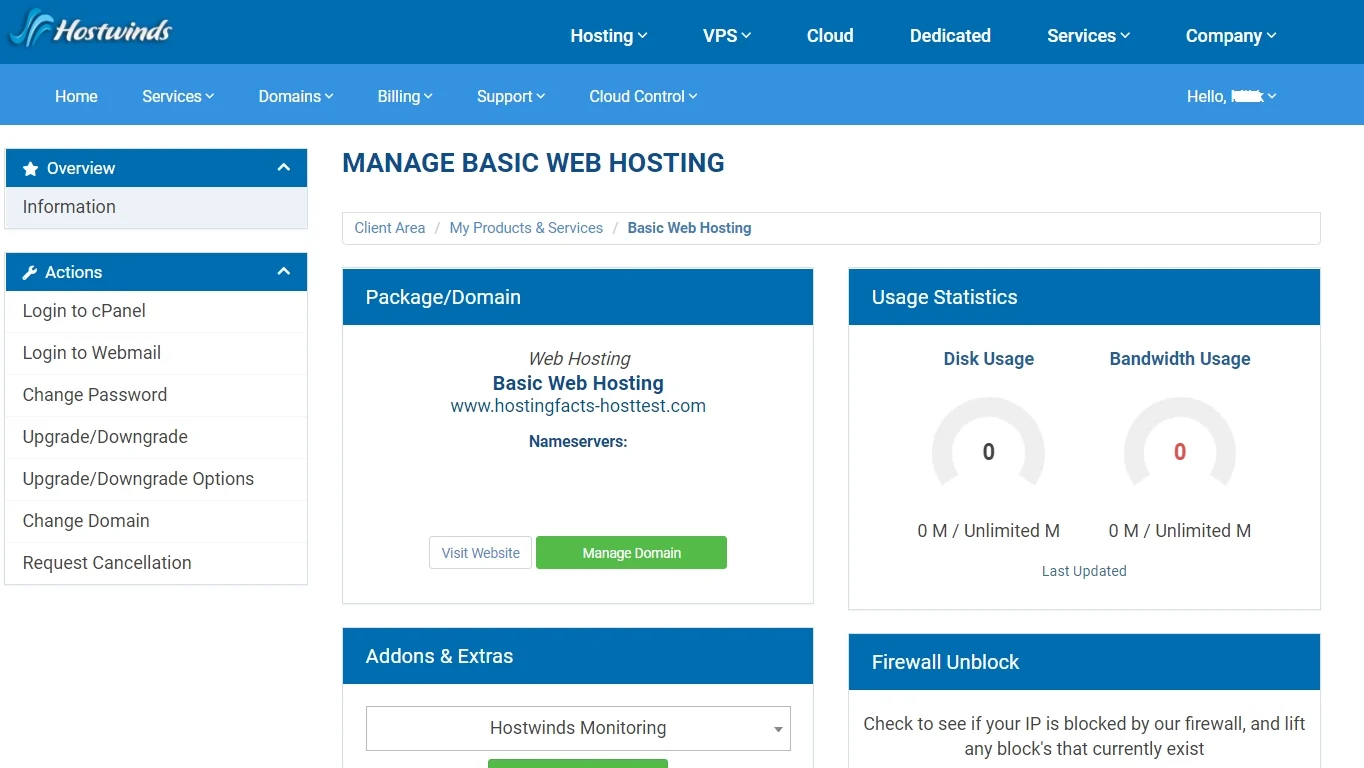
Hostwinds, on the other hand, predominantly uses cPanel for its shared, business, and reseller hosting plans. Known for its familiarity and ease of use, cPanel provides a straightforward interface that simplifies website management tasks for both novice and experienced users. Hostwinds also offers a Weebly drag-and-drop website builder for those who prefer a visual approach to website design and management. For cloud server users, Hostwinds provides a Cloud Control Portal, granting full control and flexibility over server operations. This dual approach ensures that users of all skill levels can manage their hosting environment effectively.
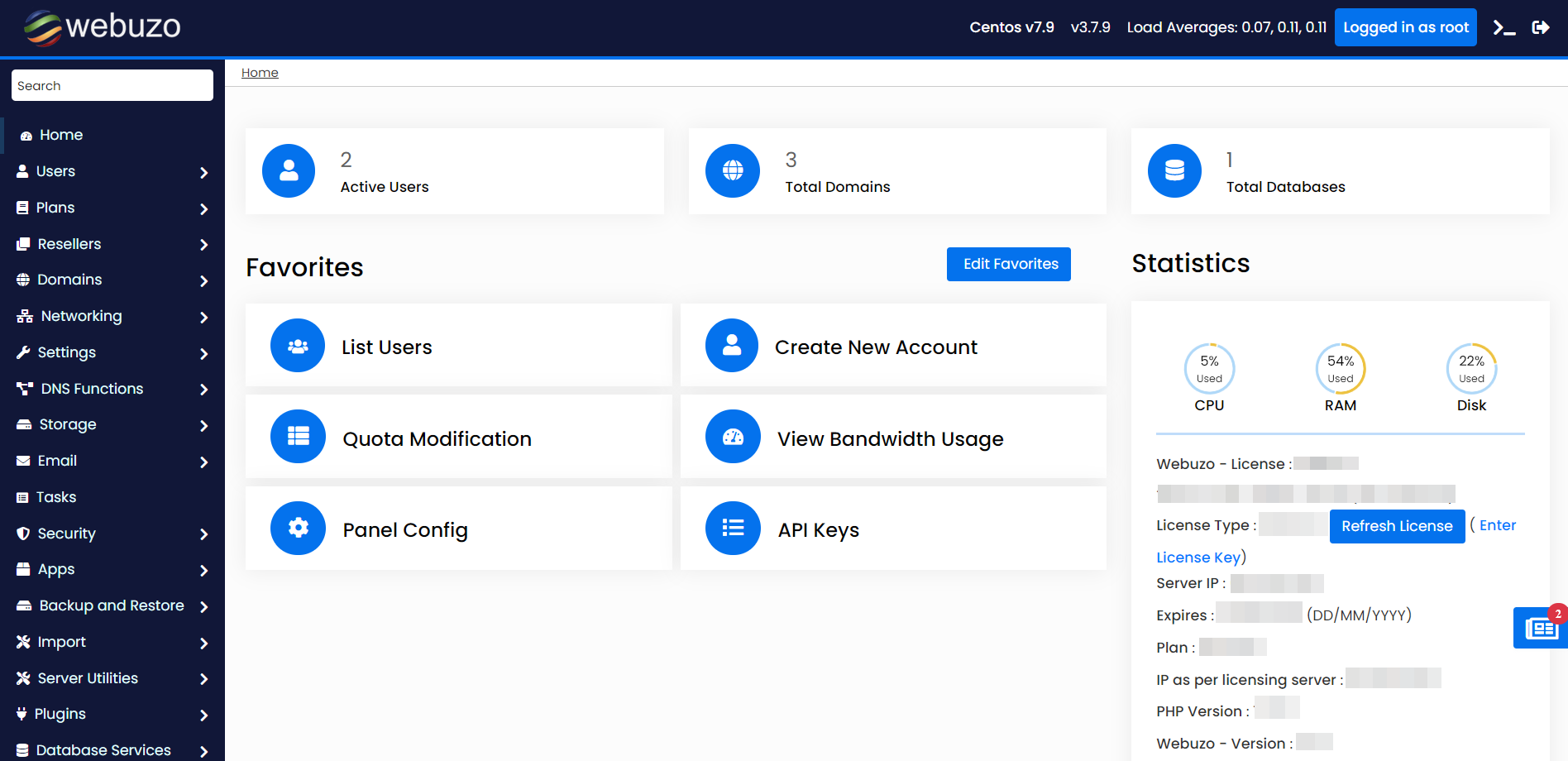
Both Namecheap and Hostwinds offer free website migration services. Namecheap utilizes the All-in-One WP Migration plugin, allowing users to migrate their site from any hosting provider at no extra cost. Hostwinds provides a similar convenience, with their support experts handling the migration meticulously across all plans. Both services ensure a smooth transition from old hosts without additional fees, making it easy for users to switch providers without disrupting their web operations.
The platforms provide extensive knowledge bases filled with guides, how-to articles, and instructional content. Namecheap offers a wide range of resources alongside 24/7 chat and phone support. Hostwinds also boasts a detailed help center with an intuitive search function and around-the-clock support via live chat, phone, and ticketing, ensuring comprehensive user support.
User management
accessibility.
Score Components:
- Role customization (40%): Flexibility in creating and defining user roles and
permissions. - Ease of management (30%): User interface and tools for managing users.
- Access control (20%): Effectiveness of access control measures for different user
levels. - Scalability (10%): Ability to manage a growing number of users efficiently.
 0.0
0.0
 0.0
0.0
When comparing the platforms’ abilities in managing user roles, permissions, and accessibility, it’s crucial to recognize that both Namecheap and Hostwinds lack specified information on these aspects. This absence makes it challenging to assess the flexibility in creating and defining user roles and permissions for either provider. Understanding their user management capabilities could have given insights into how users could assign distinct roles and permissions to manage site administration and other functions effectively, but the provided context does not include these details.
Both platforms’ user interfaces and tools for managing users remain unspecified based on the provided information. A review of their user interfaces and tools can typically include ease of navigation, intuitiveness, and any unique elements designed to streamline user management. However, due to the lack of concrete data on user management tools, it’s not possible to compare their interfaces or highlight any particular advantages or deficiencies.
Assessing the effectiveness of access control measures and each platform’s capability to manage a growing number of users efficiently is also challenging without specific data. Generally, platforms with advanced user management functionalities should offer scalable access control mechanisms that can accommodate an increasing number of users seamlessly, reducing administrative overhead and enhancing security. Unfortunately, such evaluation cannot be made with the given information.
Hostwinds User Roles Table:
| Role | Description | Access highlights |
|---|---|---|
| N/A | N/A | N/A |
Customer support
hosting provider.
Score Components:
- Support communication channels (30%): Measures the variety of customer support types
provided (live chat, chatbot, email, phone, etc.) - Availability (20%): Assesses the availability hours for each channel, including 24/7
support options. - Technical support quality (30%): Assesses whether the provider offers comprehensive
technical support, including hardware upgrades (e.g., HDD to SSD), software installations, and web
server configuration changes. - Enterprise support (20%): Checks if there are dedicated or priority support services
for enterprise-level customers.
 8.0
8.0
 8.0
8.0
🏆 Winner
Namecheap: Strong and versatile support options cater to diverse customer needs.
 |
 |
|
|---|---|---|
Phone support |
||
Live chat support |
||
Chatbot |
||
Email/ticket support |
||
Enterprise support (dedicated agent, priority support) |
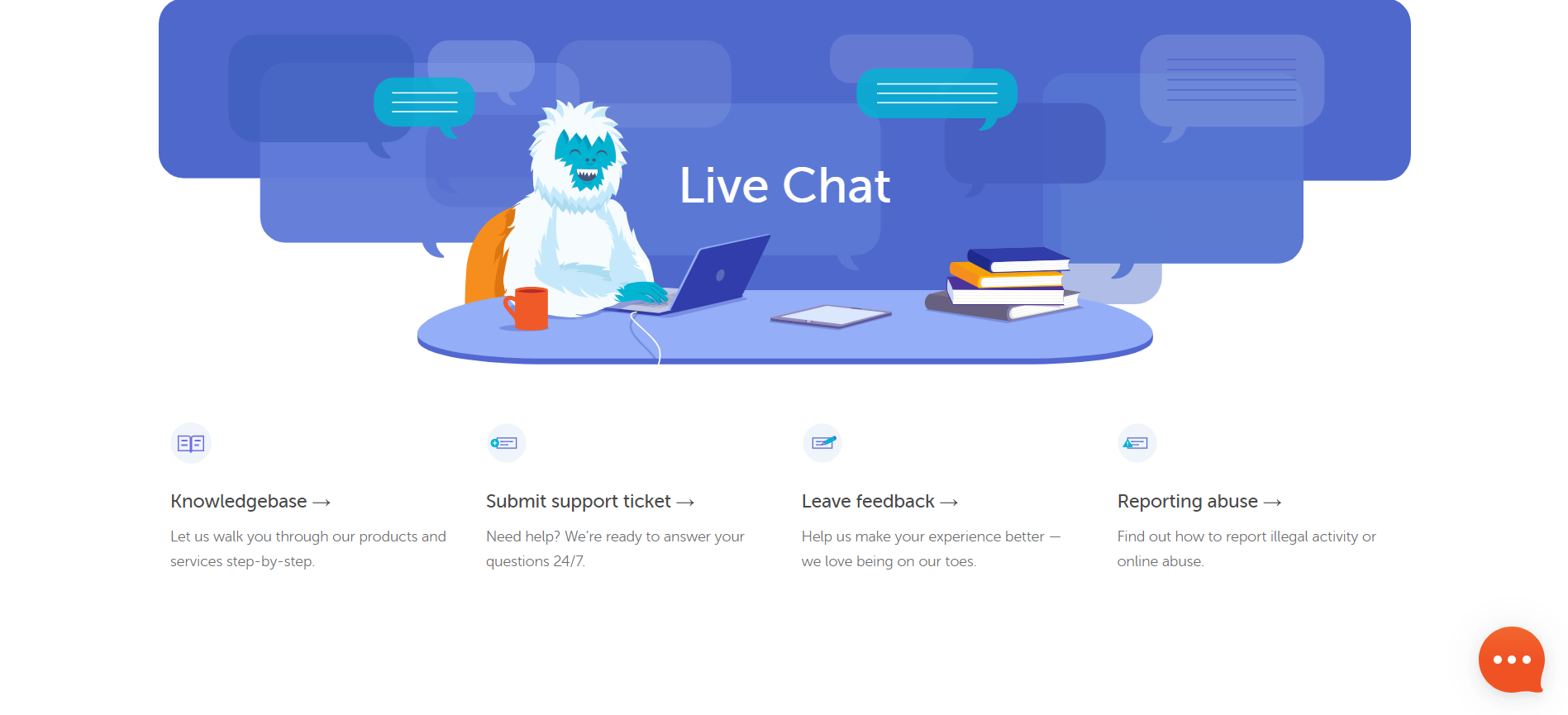
Namecheap offers broad customer service channels including 24/7 live chat, a detailed ticketing system, and a comprehensive help center featuring a rich Knowledge Base, Guru Guides, blog posts, and how-to videos. Their support is highly appreciated for being friendly and effective, especially the live chat which provides immediate assistance. Although phone support is absent, their team assists with automatic setups, efficient migration services, and guarantees minimal downtime during transitions.

Hostwinds also provides around-the-clock support through various channels including live chat, email, and phone support. The response times are quick, with guaranteed rapid replies via email and immediate responses through live chat and phone. Their support extends to tutorials, product documentation, and community resources. Though some reviews indicate mixed experiences, Hostwinds is reliable for its thorough monitoring, backup services, and straightforward control panel that includes cPanel and Softaculous for ease of use.
Namecheap vs Hostwinds: User feedback
Namecheap is widely appreciated for its affordability, reliability, and high-quality customer support. Users commend the availability of free SSL certificates, user-friendly cPanel, and outstanding hosting speed. However, shared hosting speed and the occasional slow response from support are noted concerns. Despite these minor drawbacks, Namecheap remains a popular choice for beginners and small to medium businesses due to its competitive pricing and satisfactory service quality.
Hostwinds hosting provider receives high praise for its exceptional customer service, prompt support, and reliable performance, with many users reporting significant improvements in site speed and uptime. Customers especially value the knowledgeable and responsive support team, finding them instrumental in resolving issues quickly. The user-friendly control panel and fair pricing further enhance their experience, though some note that the service can be pricier compared to competitors. However, a couple of reviews highlight issues with site migration and technical support, advising caution for WordPress users. Overall, the positive feedback significantly outweighs the negative, making Hostwinds a highly recommended choice for web hosting.
Namecheap vs Hostwinds: FAQ
Which platform is better suited for hosting WordPress websites?
Namecheap is better suited for hosting WordPress websites, offering various plans under the EasyWP portfolio, which include free CDN, free SSL, and daily backups. Hostwinds, on the other hand, does not offer specialized WordPress hosting plans. Therefore, Namecheap is the more viable option for WordPress hosting.
Are both platforms suitable for beginners?
Both Namecheap and Hostwinds are suitable for beginners. Namecheap offers a user-friendly website builder and an accessible cPanel interface, making it ideal for users new to web hosting. Hostwinds provides comprehensive customer support, including a drag-and-drop website builder, ensuring ease of use for beginners.
Which hosting service offers better security features?
Namecheap and Hostwinds both offer robust security features, but Namecheap stands out with a wider array of SSL certificates, including DV, OV, and EV, along with multiple additional security options such as FastVPN and Jellyfish spam protection. Though Hostwinds also includes strong security measures like AutoSSL and Cloudflare CDN integration, Namecheap’s more extensive security offerings make it the better choice.
What are the major differences in pricing and value between Namecheap and Hostwinds?
Namecheap generally offers lower introductory and renewal rates compared to Hostwinds, making it a more affordable option. Namecheap’s shared hosting plans start at $4.48 per month, while Hostwinds plans start at $5.24 per month. Although Hostwinds provides unlimited bandwidth and disk space, Namecheap offers competitive pricing with comprehensive features, making it the better value choice.
Which service is more suitable for hosting a high-traffic website?
Hostwinds is more suitable for hosting high-traffic websites due to its performance and scalability features. Hostwinds offers SSD storage, free dedicated IP, integration with Litespeed Web Server, and Cloudflare CDN, all of which contribute to better website performance and faster load times for high-traffic sites. While Namecheap provides good services, Hostwinds’ performance-oriented features make it more apt for high-traffic websites.
The making of this blog
We followed a clear, step-by-step process to write and research this article.









